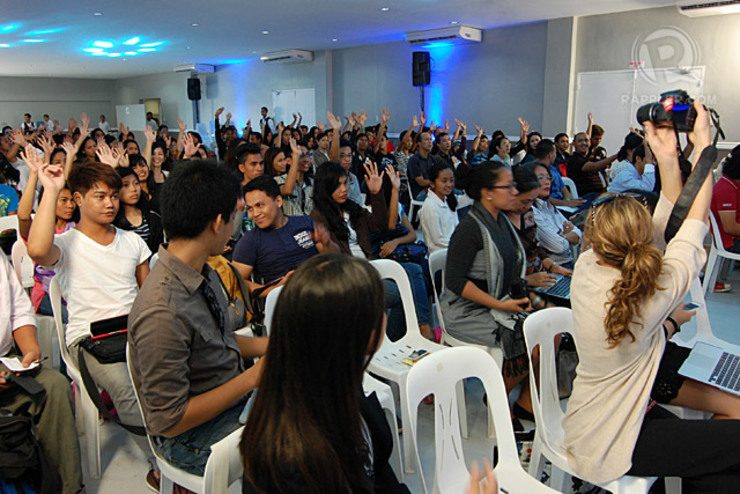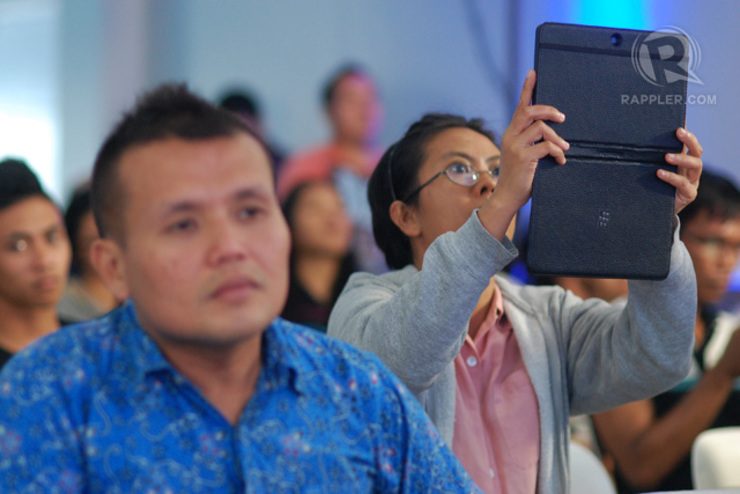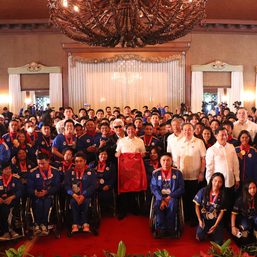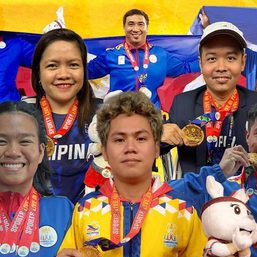SUMMARY
This is AI generated summarization, which may have errors. For context, always refer to the full article.

LEYTE, Philippines – Anyone can be a citizen journalist. But how do you do it right?
Veteran journalists in Tacloban City on Friday, September 19, said it’s all about doing your homework.
“[Some] journalists are not willing to do hard work,” said Kelli Arena, Global Center for Journalism and Democracy executive director during the 2014 PH+SocialGood: Tacloban Journalism Forum.
Arena said this mean doing “what it takes to understand what the laws are, how money was intended to be spent, to do diligent digging to make sure that what’s supposed to happen actually happened.”
Hawaii Public Radio News Director Bill Dorman said both professional and citizen journalists should understand the dynamics between national and local governments.

It’s an issue that hits close to home for the people of Tacloban, survivors of Typhoon Yolanda (Haiyan). In the immediate aftermath of the storm, the worst to make landfall in history, relief was perceived to be slow and wanting. (READ: Mar Roxas to CNN: No response fast enough)
While typhoon survivors were homeless and waiting for much-needed help to arrive, the local and national officials were locked in a public word war: the city mayor seemingly at odds with national government officials over post-Yolanda issues.
Tacloban City Mayor Alfred Romualdez is not only from a different political party, he is also the nephew of former First Lady Imelda Romualdez Marcos. Her husband, Ferdinand Marcos, was the political foe of Senator Benigno Simeon “Ninoy” Aquino Jr, the father of President Benigno Aquino III. (READ: Roxas hits Romualdez for ‘malicious’ video)
Dorman advised journalists covering disasters to “find situations that are working to highlight those that are not.”But that the same time, he emphasized, “Priority is fixing the problem; fixing the blame can come later.”
The core of disaster reporting, after all, are the people. (READ: After Yolanda: Village 88)
“Put faces on the numbers and tell the stories behind the statistics,” added Dorman.
Post-disaster corruption
The journalist’s role – both professional and citizen journalists – becomes even more important once relief efforts end, and the even harder task of rehabilitation begins.
Almost one year after Yolanda made landfall, rehabilitation efforts have received the same criticism as relief operations 10 months past. It was only in August when the Philippines finalized its P171-B Yolanda rehab plan.
Thousands of typhoon survivors still live in makeshift houses, in tents that were designed to provide shelter for only a few months at most. (READ: No kid survives Tacloban tent fire)
Rumors of rehabilitation corruption, some of them from government officials themselves, have yet to be proven by government-led probes.
“When you follow the money, you get the story,” said Dorman. (READ: No solid proof of Yolanda ‘corruption’?)
Rappler CEO and Executive Editor Maria Ressa admitted corruption in the country is “embedded” – even journalists are corrupt. It’s the silence that kills; the same kind that allows senators to allegedly steal millions in pork barrel funds, the same kind that makes it “okay” for journalists receive “gifts” from politicians, the same kind that allows would-be thieves from pocketing Yolanda funds.
“It’s really taking a stand against corruption. If you take that line [and] hold both private and government sector accountable, that’s up to you,” said Ressa.
“If you decide it’s not okay, be the area of influence among friends, family. Say no. Demand they say no,” she added.
Arena acknowledged saying “no” and taking a stand may seem easier said than done but added one journalist proved otherwise. She was referring to Cairo-based journalist Shahira Amin, who would be speaking in the afternoon session of the forum.
Here are a few other tips for aspiring journalists and citizen journalists from the panel:
- Protect yourself and your sources
- Use the small story with specifics to tell the bigger story of trends
- Narrow your focus; concentrate your energy and your resources
- Small victories lead to bigger ones – progress is often incremental rather than sudden and dramatic; patience is part of perseverance
- Prepare local, regional, national economic statistics on-hand
- Know the evacuation plans
- Understand the lessons learned from past disasters
Rappler kicked off the third of 4 all-day think-sessions about what technology and the future hold for us. The forum was organized with Microsoft, the Global Center for Journalism and Democracy, AC Communications and IP Star, Friedrich Naumann Foundation, International Organization for Migration, and World Vision Development Foundation.
On Saturday, September 20, Rappler will hold PH+SocialGood: Tacloban #2030NOW. Watch it live on the site homepage. – Rappler.com
Add a comment
How does this make you feel?





There are no comments yet. Add your comment to start the conversation.